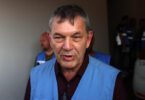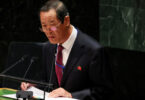LONDON (TASS): Consideration of the appeal of the US Department of Justice on the case of extradition from the UK of Wikileaks founder Julian Assange will take place on October 27-28. This was announced on Wednesday by the judge of the High Court of London Tim Holroyd following preliminary hearings.
The dates were chosen in consultation with attorney Claire Dobbin representing the US government and attorney Edward Fitzgerald, who is defending Assange. “Full hearings will be held on October 27-28. Two weeks before the deadline, the parties must briefly present their arguments to the court,” Holroyd said.
The main issue that was examined at the meeting on Wednesday was a request by lawyers of the United States government to reconsider the possibility of filing an appeal based on all five provisions that underlie the appeal. In July, London High Court Judge Jonathan Swift only partially allowed an appeal against the decision of the Old Bailey Central Criminal Court in the British capital, which refused to extradite Assange due to the risk of suicide of the journalist if he was extradited to the United States.
During preliminary hearings, the US Department of Justice insisted on disagreement with the allegedly biased psychiatric assessment of Assange’s current state and the likelihood of his suicide, which was contained in a report by Michael Kopelman, professor of neuropsychiatry at King’s College London. It was on the basis of his findings that Old Bailey Central Criminal Court judge Vanessa Baraitser refused to extradite the journalist to the United States.
Dobbin, during a speech in the High Court of London, said that doctors Nigel Blackwood and Cena Fazel, who also studied Assange’s condition, did not agree with Kopelman’s conclusion about severe depression and an increased likelihood of his suicide. In particular, she drew attention to the fact that the long stay of the founder of Wikileaks in conditions of restriction of freedom did not affect his romantic relationship with his girlfriend Stella Morris, from whom he had two children. At the same time, as Dobbin added, Kopelman did not mention in his reports that Assange had children from Morris, thereby, in her opinion, trying to “mislead Judge Baraitser.”
In turn, Fitzgerald said that Kopelman did not reflect information about Assange’s intimate life because of “concern for the safety of his loved ones.” As a result, Judge Holroyd took the side of the US Department of Justice in this matter, allowing him to appeal against Baraitser’s decision on all counts.
Court protests
Several dozen of Assange’s supporters gathered in a preliminary hearing outside London’s High Court on Wednesday. Former leader of the opposition Labor Party, Jeremy Corbin, was seen among the demonstrators, according to footage shown on Sky News . Many protesters came with placards demanding that the Australian be released immediately.
Assange himself was not present in the High Court on Wednesday: he followed the process from London’s Belmarsh prison via video link. He wore glasses and a white shirt with an untied tie and a medical mask that was lowered from his nose.
Assange case
At the moment, the founder of WikiLeaks is in London’s Belmarsh prison, where he has been held since April 2019 after the Ecuadorian embassy in the British capital denied a journalist asylum, which was provided to him for seven years. In January, the Westminster Magistrates’ Court refused to extradite Assange to the United States, where 18 criminal charges were brought against him, but at the same time did not release the journalist on bail pending an appeal by the American prosecutor’s office.
The judicial authority ruled that the extradition of the founder of WikiLeaks to the American authorities would be unlawful, as the autistic and clinically depressed Assange is ready to commit suicide and will carry out his plan if he ends up in an American prison. Judge Baraitser’s conclusions were based on evaluations by psychologists and experts.
In the United States, Assange, in particular, is accused of crimes related to the largest case of classified information disclosure in American history. On the aggregate of the charges brought against, the founder of WikiLeaks faces up to 175 years in prison.






